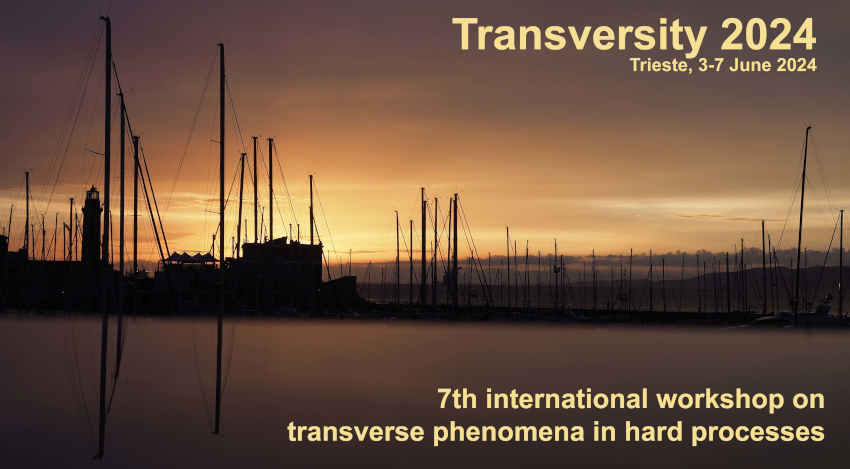
Trieste, Italy
published December 04, 2024
Transversity 2024 was the 7th International Workshop in the, now consolidated and well-affirmed, series “Transverse Phenomena in Hard Processes and the Transverse Structure of the Proton”.
The series began in Como with Transversity 2005, held within the context of an Italian Research Project of National Interest (PRIN2003). The workshop aimed to gather those experimentalists and theoreticians heavily engaged in the investigation of transverse spin in hadronic physics, to favour the exchange of theoretical and experimental ideas on the subject and to strengthen the ties between the various experimental and theory groups worldwide. In those early years, we were beginning to see the very first experimental results demonstrating that transversity was not merely “an intangible and remote object”, related theoretical progress was solid and ongoing; the workshop was thus a genuine success.
Over the following years, the remarkable progress made in the understanding of nucleon structure and the relevance of transverse degrees of freedom, together with the very positive experience of the first edition, inevitably led to continuation of the Transversity Workshop series: next in Ferrara (2008), then Trieste/Lošinj (2011), Cagliari (2014), Frascati (2017), Pavia (2022) and once again now in Trieste (2024).
The scientific programme of Transversity 2024 was prepared by the Local Organising Committee1 in collaboration with the International Advisory Committee2. In line with the previous editions, the workshop was mainly devoted to the most recent developments in the study of nucleon structure. There were critical review talks and specific contributions on the latest experimental results and theoretical progress in the field of transversity, transverse-momentum dependent distribution and fragmentation functions and generalised parton distribution functions. Future research directions, in both theory and experiment, were presented and discussed. A substantial fraction of the available time was dedicated to open discussion and a round table was held on the more debated points regarding the extraction of transversity.
As always, the number of participants was strictly limited, but representatives of nearly all the more dedicated theory groups and experimental collaborations active in major national laboratories and research institutions (BNL, CERN, JLab, KEK, CAS/IHEP) were present and contributed enthusiastically. Moreover, in keeping with the workshop philosophy, high priority was given to the new generations of scientists in the field: the percentage of young physicists attending was sizeable and three prizes for the most outstanding presentations were awarded.
In conclusion then, with Transversity 2024, it has once again been more than amply demonstrated that the desire to meet in a friendly environment open to discussion is still very much alive and that these workshops are highly appreciated and extremely fruitful. Indeed, the series will not stop here, but will continue in Turin, most likely in 2026.
Transversity 2024 was endorsed by the International Committee for Spin Physics (ISPC), sponsored by the Istituto Nazionale di Fisica Nucleare, UniTS, NuPECC, supported by the Trieste Section of the INFN and by the Physics Department of UniTS.
1 LOC members: Alessandro Bacchetta (University of Pavia), Mariaelena Boglione (University of Torino), Andrea Bressan (University of Trieste), Marco Contalbrigo (INFN Ferrara), Umberto D'Alesio (University of Cagliari), Anna Martin (University of Trieste), Marco Mirazita (INFN LNF), Barbara Pasquini (University of Pavia), Philip Ratcliffe (University of Insubria), Patrizia Rossi (Jefferson Lab and INFN LNF).
2 AC members: Constantia Alexandrou (U. of Cyprus ). Mauro Anselmino (INFN Torino), Harut Avagyan (Jefferson Lab), Daniel Boer (R. U. Groningen), Franco Bradamante (INFN Trieste), Oleg Denisov (INFN Torino), Nicole D'Hose (CEA Saclay), Oleg Eyser (BNL), Haiyan Gao (BNL, Virginia U.), Andreas Metz (Temple U.), Francesco Murgia (INFN Cagliari), Bakur Parsamyan (AANL, CERN, INFN Torino), Alexei Prokudin (Penn State U.), Marco Radici (INFN Pavia), Jianwei Qiu (Jefferson Lab), Gunar Schnell (U. of the Basque Country UPV/EHU), Werner Vogelsang (Tuebingen U.), Feng Yuan (LBNL)
Editorial Board
- Andrea Bressan
University of Trieste and INFN-Trieste - Anna Martin
Trieste University & INFN

| Main session |
|---|
|
Transversity: theory/phenomenology overview
|
|
Nucleon Transversity from lattice QCD
|
|
STAR Results on Transversity and TMD-Related Observables
|
|
New Measurements of Transverse Spin Asymmetries at COMPASS
|
|
Monte Carlo results on the Collins asymmetries in e+e− annihilation
|
|
Transversity from Single-Hadron TSSAs and Dihadron Fragmentation Theory Developments
|
|
Updates on transversity extractions
|
|
Further direct extractions of the transversity functions
|
|
The 3D nucleon structure at Jlab 12 and 24
|
|
Accessing TMDs with semi-inclusive deep-inelastic scattering with CLAS12 at JLab
|
|
TMD phenomenology and nonperturbative structures
|
|
Di-hadron fragmentation in reduced dimensionality and Λ hyperon beam-spin transfer
|
|
Overview on the theory and phenomenology of generalized parton distributions
|
|
Twist-3 contribution to deeply virtual electroduction of pions
|
